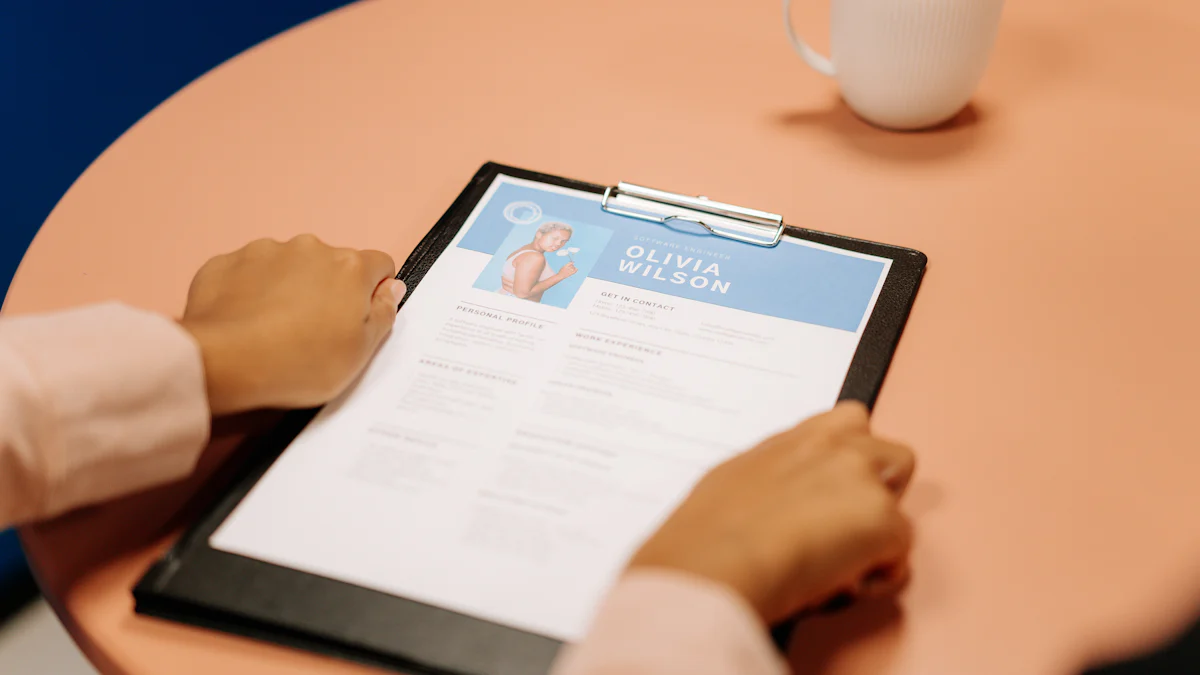How to List Remote Job Locations on Your Resume in 2025
Try Aihirely for
Smarter Interview Prep
Experience real-time AI support tailored to your Resume.
Boost your confidence and ace every question with
AI Mock Interview.

Image Source: pexels
Remote work isn’t just a trend anymore—it’s a skillset. Employers in 2025 want to see that you can thrive in a virtual environment. Listing your remote work experience shows them you’ve mastered time management, digital communication, and adaptability. Wondering, “For location of remote job what do I put resume?” Simply adding “Remote” to your job title or description makes it clear. Highlighting this experience gives you a competitive edge, proving you can handle the unique challenges of working independently while staying productive and connected.
Key Takeaways
-
Show your remote work experience on your resume. This proves you can succeed in online jobs.
-
Write ‘Remote’ in your job titles or descriptions. This helps employers quickly see your remote work.
-
Highlight important skills like time management, online communication, and flexibility. These make you stand out.
-
Share measurable results from your remote jobs. This makes your resume stronger.
-
Change your resume for each job. Use the right keywords and focus on your remote work skills.
Why Highlighting Remote Work Experience Matters

Image Source: pexels
The growing demand for remote work in 2025
Remote work isn’t slowing down. In fact, it’s becoming the norm in many industries. By 2025, nearly half of full-time U.S. workers will have jobs that can be done remotely. About 27% of these workers will be fully remote, while 53% will follow a hybrid schedule. This shift isn’t just about convenience. Employees working remotely or in hybrid roles report higher engagement compared to those on-site.
Certain industries are leading this trend. Technology, healthcare, and digital marketing are seeing the highest growth in remote opportunities. Roles like software engineering, data analysis, and user experience design are in high demand. If you’re in one of these fields, showcasing your remote work experience can make you stand out.
How remote work demonstrates adaptability and independence
When you work remotely, you prove you can adapt to different environments. Employers know you can handle challenges like managing your time without supervision or staying productive in a home office. These skills show you’re independent and reliable.
Think about it—remote work requires you to juggle tasks, meet deadlines, and communicate effectively, often without face-to-face interaction. This level of adaptability is a huge asset. It tells employers you’re ready to take on responsibilities and thrive in any setting.
Why employers prioritize remote-specific skills
In 2025, employers are looking for more than just technical skills. They want candidates who excel in communication, time management, and problem-solving. Remote roles also demand tech-savviness and self-motivation. These skills are essential for navigating digital tools, collaborating with virtual teams, and staying focused.
When you list remote work on your resume, you’re showing you have these abilities. For example, you might highlight how you led virtual meetings or managed multiple projects independently. These details can set you apart from other candidates.
For Location of Remote Job What Do I Put Resume
Adding “Remote” to job titles
When listing remote jobs on your resume, clarity is key. Adding “Remote” to your job title or company name instantly tells employers you worked virtually. This small detail can make a big difference in how your experience is perceived.
Examples of job titles with “Remote”
Here are some examples of how you can label remote roles:
-
Accountant (Remote)
-
Software Engineer – Remote
-
Online Instructor (Remote)
These formats work well because they’re straightforward and easy to spot.
When to use “Remote” versus a specific location
If your role was entirely remote, always include “Remote” in the title or next to the company name. For example:
- Marketing Specialist, XYZ Company (Remote)
However, if the position was hybrid, you can list the company’s physical location and mention remote work in the description. For instance:
-
Project Manager, ABC Corp (New York, NY)
- Managed a hybrid schedule, working remotely three days a week.
This approach keeps your resume accurate while highlighting your remote experience.
Including remote work in job descriptions
Your job descriptions should emphasize the unique aspects of remote work. This is where you can really shine by showcasing your responsibilities and achievements.
Highlighting remote-specific responsibilities
Focus on tasks that demonstrate your ability to work independently and collaborate virtually. For example:
-
Coordinated with cross-functional teams across different time zones to meet project deadlines.
-
Used tools like Slack and Zoom to maintain seamless communication with team members.
Showcasing achievements in a remote setting
Employers love seeing results. Highlight accomplishments that show your impact while working remotely:
-
Increased team productivity by 20% by streamlining digital workflows.
-
Delivered a $500K project on time and under budget while managing a fully remote team.
These examples prove you can excel in a virtual environment.
Formatting tips for remote work experience
A well-formatted resume makes your remote experience stand out. Here’s how to do it:
Consistent formatting for clarity
Keep your formatting clean and consistent. Use standard headings and ensure your resume is ATS-friendly. For example:
-
Job Title, Company Name (Remote)
-
Bullet point 1
-
Bullet point 2
-
This layout is easy to read and highlights your remote roles effectively.
Using bullet points to emphasize key details
Bullet points are your best friend. Use them to summarize your achievements and responsibilities. Keep each point concise and results-driven, like this:
-
Improved communication efficiency by implementing new collaboration tools.
-
Managed a team of 15 employees across five time zones.
By focusing on outcomes, you’ll make your resume more impactful.
Skills to Highlight for Remote Work

Image Source: pexels
Key remote-specific skills
Remote work requires a unique set of skills that employers value highly. Highlighting these on your resume can make you stand out. Here are some of the most important ones:
-
Time Management: Juggling multiple tasks without direct supervision.
-
Digital Communication and Collaboration: Using tools to connect and work with teams across locations.
-
Self-Motivation and Discipline: Staying productive and focused in a home office.
-
Adaptability: Quickly adjusting to new tools, processes, or challenges.
-
Problem-Solving: Tackling issues independently and finding solutions.
-
Tech Savviness: Familiarity with platforms like Slack, Zoom, and project management tools.
Mastering these skills shows you’re ready to thrive in a remote environment.
Communication and collaboration tools
Employers want to know you’re comfortable with the tools that make remote work possible. Some of the most commonly used ones include:
-
Microsoft Teams: Great for video calls, instant messaging, and screen-sharing.
-
Zoom: Perfect for group meetings, with features like chat and whiteboards.
-
Slack: Ideal for quick messaging and team discussions.
-
Google Chat: A simple way to share content and collaborate in real-time.
These tools help teams stay connected, whether it’s through video conferencing, document sharing, or task management. Mentioning your experience with these platforms can give you an edge.
Time management and self-discipline
Time management and self-discipline are essential for remote roles. Employers want to see that you can handle deadlines and stay organized. You can demonstrate this by mentioning achievements like:
-
Completing multiple projects ahead of schedule.
-
Reducing costs by streamlining workflows.
-
Improving productivity through better task prioritization.
These examples show you’re efficient and reliable, even without direct supervision.
How to demonstrate these skills on your resume
Examples of quantifiable achievements
Quantifying your achievements makes your skills more tangible. For instance:
-
“Collaborated remotely with ten department managers to implement policies that increased efficiency by 20%.”
-
“Improved customer satisfaction by 25% in six months through virtual support.”
-
“Boosted team productivity by 20% by introducing new digital workflows.”
Numbers and percentages make your accomplishments stand out and give employers a clear picture of your impact.
Using action verbs to describe skills
Action verbs bring your resume to life. Use words like:
-
Initiated
-
Coordinated
-
Facilitated
-
Improved
-
Delivered
-
Achieved
For example, instead of saying, “Handled virtual meetings,” you could say, “Facilitated weekly virtual meetings to align cross-functional teams.” This approach makes your resume more dynamic and engaging.
By focusing on these skills and presenting them effectively, you’ll show employers you’re ready to excel in any remote role.
Common Mistakes to Avoid
Being vague about remote work experience
Why specificity matters
When describing your remote work experience, being specific is crucial. Employers want to see clear evidence that you’ve successfully worked remotely. Vague descriptions like “Worked from home” don’t cut it. Instead, detail how you managed tasks, collaborated with teams, or used specific tools. This shows you have the skills and qualifications they’re looking for in a remote candidate.
Specificity also highlights your ability to work independently. It demonstrates that you’re familiar with remote-friendly software and processes. For example, mentioning tools like Slack or Trello shows you’re tech-savvy and ready to hit the ground running.
Examples of clear versus unclear descriptions
Let’s compare two examples:
-
Unclear: “Handled team communication remotely.”
-
Clear: “Facilitated weekly virtual meetings using Zoom to align a team of 10 across three time zones.”
The second example paints a vivid picture of your role and impact. Always aim for clarity and detail to make your experience stand out.
Omitting key remote-specific skills
How this can hurt your chances
Leaving out remote-specific skills can hurt your chances of landing a job. Employers prioritize candidates who can demonstrate time management, digital communication, and self-motivation. If you don’t showcase these abilities, they might assume you lack the experience to thrive in a remote role.
Ignoring these skills also makes your resume less competitive. Many applicants will highlight their remote expertise. If you don’t, your application could get overlooked.
Tips for identifying relevant skills
To identify the right skills, think about what remote work requires. Did you manage your time effectively? Did you use tools like Microsoft Teams or Asana? Highlight these. Focus on skills like:
-
Managing deadlines without supervision.
-
Communicating across time zones.
-
Solving problems independently.
Tailor your resume to the job description. If the posting mentions specific tools or skills, include them if they match your experience.
Overloading your resume with unnecessary details
Keeping it concise and relevant
A cluttered resume can overwhelm hiring managers. Keep it concise by focusing on recent and relevant experience. Stick to the last 10 years of your career and remove outdated roles. Use bullet points to summarize your responsibilities and achievements. Each point should be two lines or fewer.
For example:
-
“Increased team productivity by 15% by implementing new collaboration tools.”
-
“Managed a $1M project remotely, delivering it on time and under budget.”
These short, impactful statements grab attention without wasting space.
Avoiding redundancy in job descriptions
Redundancy can make your resume feel repetitive. Avoid listing the same responsibilities for multiple roles. Instead, focus on unique achievements for each position.
Also, skip unnecessary details like your full mailing address or an objective statement. Employers care more about your skills and accomplishments. Keep your resume clean and easy to read by optimizing for scannability with clear headings and white space.
By avoiding these common mistakes, you’ll create a resume that’s polished, relevant, and ready to impress.
Listing your remote work experience effectively can make all the difference in landing your next role. It shows employers you’ve got the skills to thrive in a virtual environment. Highlight your achievements, label remote roles clearly, and include tools or platforms you’ve mastered.
Tailor your resume for each job. Use keywords from the job description and focus on relevant skills like communication and time management. Keep it concise and results-driven.
Want to stand out? Quantify your accomplishments, showcase your tech-savviness, and express enthusiasm for the role. These small tweaks can help you shine in a competitive remote job market. 🌟
FAQ
How do I list a fully remote job on my resume?
You can add “Remote” next to the job title or company name. For example:
- Job Title, Company Name (Remote)
This format makes it clear you worked virtually and helps employers spot your remote experience quickly.
Should I include hybrid roles on my resume?
Yes! Mention the company’s location and note the hybrid nature in the description. For example:
-
Project Manager, ABC Corp (New York, NY)
- Worked remotely three days a week while managing on-site tasks.
This shows flexibility and adaptability.
- Worked remotely three days a week while managing on-site tasks.
What tools should I highlight for remote work?
Focus on tools like Slack, Zoom, Microsoft Teams, and Trello. These platforms are essential for communication and project management. Mentioning them shows you’re tech-savvy and ready to collaborate in a virtual environment.
Do I need to specify remote achievements?
Absolutely! Highlight accomplishments that show your impact in a remote setting. For example:
- “Increased team productivity by 20% using digital workflows.”
Quantifiable results make your experience stand out.
Can I list remote work if it wasn’t in the job title?
Yes, you can! Add “Remote” in parentheses next to the company name or explain it in the job description. For example:
- Marketing Specialist, XYZ Company (Remote)
This ensures your resume reflects your virtual work experience accurately.
💡 Tip: Always tailor your resume to the job description. Highlight remote skills and tools that match the role you’re applying for.
